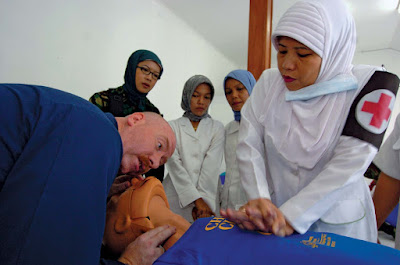From “dirty” to dignified
Dalits are deemed “untouchable” by this system, because of their occupations: for instance, cleaners of human waste (manual scavengers) and dead animals, leather workers, street sweepers and cobblers. As such, they face social discrimination, even though “untouchability” and caste discrimination are illegal.
It is this oppression, which consigns millions to injustice and poverty, that Ankit is trying to tackle.
But the social enterprise, based in Ankit’s hometown of Kanpur, didn’t start out with the purpose of empowering Dalit women.
It had another problem in mind: the endless stream of flowers entering India’s rivers each day, offered by devotees at temples.
“There are over 200 temples in Kanpur, and the total waste was more than four tonnes a day, ” says Karan Rastogi, co-founder of HelpUsGreen, and Ankit’s childhood friend.
Wanting to prevent the pesticide and chemical-ridden flowers from adding to the water pollution, they began tinkering in their kitchens, looking for ways to turn unwanted flowers into useful products.
Beginning with humble compost, the duo soon moved on to create incense sticks and cones — with harmful chemicals like arsenic and lead removed, using a formula they cooked up.
The brand name they dreamed up for these products? Phool, which is Hindi for ‘flower’.
Along the way, it became clear that the social enterprise could do more — empower marginalised women by hiring them.
“It’s very easy for us to ask, ‘Why do these people do these jobs? Why do they pick up people’s excreta?’,” notes Ankit. “But once a person knows that the person was cleaning sewage or drain pipes, rarely does anyone want to employ them.”
So he sought not only to hire women — to sort the collected flowers and craft the incense by hand — but also to create a working environment that treated them as equals.
The women earn 7,860 rupees a month (about US$112), which is slightly above the minimum wage for skilled workers in India.
And aside from benefits like health insurance, “the first thing that we did was to provide clean drinking water, second was a toilet.”
“Two things that make sure everyone in our company is equal. Once you start having the same water, you're all equal,” says Ankit.
Ranjana, one of the women who works for Ankit, knows what it means to be treated less than equal.
She once toiled as a hospital worker, who cleaned up after patients. “It was not dirty work, but everyone calls it dirty work, dirty work, dirty work. [But] hunger is a big thing. You have to work no matter how dirty your work is.”
Some employers, she says, think “servants should remain servants, for their whole life. I can do any work, but not as a slave,” says Ranjana.
After she found a job at HelpUsGreen through her niece, her life changed.
With pride, Ranjana shares that her bank account “always has 2,000, 4,000 rupees (about US$30 to 60), it’s never empty.”
She and her husband no longer pay their children’s school fees late. And not only did she buy an LCD television, she was the first of HelpUsGreen's Dalit employees to own a washing machine.
More significantly, “those of other castes, the Pandits, the Yadavs, today they come to my home, sit, have tea.
“They never used to speak to my children. But in five months here, it has all changed,” says Ranjana, her eyes sparkling. “What will happen in years? Only God knows.”
By 2020, Ankit and Karan want to employ 3,700 women (compared to 79 now), while recycling at least 50 tonnes of waste flowers every day.
Aside from Phool incense and compost, the social enterprise is launching a line of eco-friendly packaging material made from waste flowers, which they call Florafoam — akin to Styrofoam, but biodegradable.
While the social enterprise continues to make innovative, sustainable products, “the heart of Phool is the women who make these products,” says Ankit.
“When [the women] start working with us, there's a perspective change that happens. They feel more confident about themselves. Cara Melihat ODDS Dalam Judi Bola Terpercaya
“So it is not only about financial livelihoods, but also about dignity and respect.”



